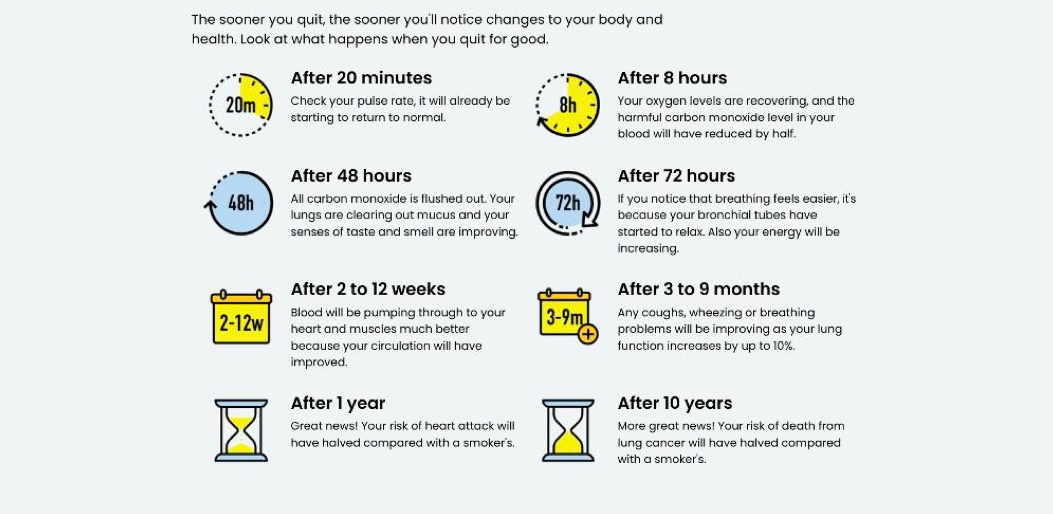Preventing Cancer – EONS PrEvCan Campaign
Recommendation 1: Do not smoke. Do not use any type of tobacco.
Everyone is aware of the risk of cancer with smoking. Governments have been campaigning for years to support people to quit smoking or to not start in the first place – from education on cigarette packets to smoking prevention methods and alternatives. But there is still a significant prevalence of smoking throughout the world and therefore a persistently high risk of cancer and other illnesses for both the smoker and those exposed to cigarette smoke.
The popularity of smoking
While cigarette smoking rates have declined in the US and UK since the 1960s, global smoking rates have continued to increase across the world. For example, in China, in 1911, the Chinese smoked 7.5 billion cigarettes. By 2012, this had risen to 2.4 trillion (1).
How smoking increases the risk of cancer
A series of major medical reports in the 1950s-1960s demonstrated how harmful smoking can be. Smoking is not only a driver of cancer development, it also prevents the body from fighting it (2).
Firstly, the toxins in cigarettes lower the immune system, making it harder for the body to fight cancer cells and consequently allowing increased cancer cell proliferation. There is therefore a high chance of cancer development because the immune system has been unable to destroy those mutated cells that, in general, the body is so efficient at killing.
Secondly, these poisons also cause damage or alteration to cell DNA. When the DNA is damaged, the cell can begin to grow out of control and develop into a cancerous tumour.
The cancer most commonly associated with smoking is lung cancer. Nearly 9 out of 10 lung cancers are caused by smoking or second-hand smoke exposure (3). Worryingly, there is a greater risk of cancer development than there was 50 years ago, most likely because of how cigarettes are made and the chemicals they contain.
Tobacco products contain:
- Nicotine (the addictive element but relatively harmless)
- Carbon monoxide (a poison gas which displaces oxygen in the bloodstream and
causing the heart to work harder and lungs to stop working properly) - Tar (contains carcinogens, narrows the bronchioles and damages the cilia)
- Toxic chemicals such as benzene, arsenic and formaldehyde (4)
In the UK 2017-2019, there were 34,771 deaths from lung cancer, and from 2013-2017, only 10% of lung cancer patients had survived for >10 years. However, 79% of lung cancer were deemed to have been preventable in 2015 alone (5).
Smoking also increases the risk of multiple other cancers:
- Bladder
- Cervical
- Colon and rectal
- Haematological
- Larynx
- Liver
- Mouth and throat
- Oesophageal
- Pancreas
- Renal
- Stomach
Smokeless tobacco, such as chewing tobacco, also causes cancer, including:
- Oesophageal
- Mouth and throat
- Pancreatic
It is also worth highlighting that smoking not only increases the risk of cancer but affects every organ in the body. It can cause damage to the eyes; including macular degeneration, cataracts, weaken the bones, increase the risk of type 2 diabetes, acid reflux and stomach ulcers and lead to sexual dysfunction and impacting fertility (6).
Prevention methods
The majority, if not all, people working with cancer patients can recall at least one patient who’s regretted smoking. Those patients at the end of life whose cancer could have been caused by smoking who blame themselves – and cigarettes – for their current position. But how can you support people to stop?
Firstly, it is important to know that people will only make a sustained change in life if they really want to and are committed to it. Here’s how:
- Making a list of reasons for quitting can help to keep focus and determination.
- Get support from others – tell friends and family you’re quitting so they can help keep
you on track. - Use stop smoking aids; nicotine patches, gum, vaping help to ease the cravings.
- Understanding and avoiding the triggers for smoking.
- Some find that the slow, deep breathing required for inhalation to be a bit part of the
‘calming effect’ of smoking. Developing and utilising breathing techniques can give
that calming effect without the toxic effect of cigarettes. - When cravings hit, distraction is key. Keep busy, exercise the cravings away, change
the focus.
Look at the benefits...

Source: NHS Stop Smoking (7)
Changing lifestyle is never easy. It takes realisation, determination and commitment. One day at a time is the key and having the support of people around you can be the difference between success or failure.
Making patients, friends, family, colleagues aware of the risks of smoking, the support that’s available to help with quitting and supporting them without judgement or opinion may just make the difference. If it takes away one extra reason for developing cancer it’s worth it.
And if you’re reading this with a cigarette in your hand... make this the moment you decide to quit.
Find out more about the PrEvCan campaign at https://cancernurse.eu/prevcan/
References
- Edwards, P., (2015) ‘What everyone gets wrong about the history of cigarettes’https://www.vox.com/2015/3/18/8243707/cigarette-rolling-machines
- U.S. Department of Health and Human Services (2010) A Report of the Surgeon General. How Tobacco Smoke Causes Disease: The Biology and Behavioural Basis for Smoking-Attributable Diseasehttps://www.cdc.gov/tobacco/campaign/tips/diseases/cancer.html#four [accessed 22/09/22].
- U.S. Department of Health and Human Services (2014) The Health Consequences of Smoking—50 Years of Progress: A Report of the Surgeon General. https://www.cdc.gov/tobacco/campaign/tips/diseases/cancer.html#five [accessed 22/09/22].
- NHS Inform (2022) Tobacco https://www.nhsinform.scot/healthy-living/stopping- smoking/reasons-to-stop/tobacco [accessed 22/09/22]
- Cancer research UK (2021) Lung cancer statistics https://www.cancerresearchuk.org/health-professional/cancer-statistics/statistics-by- cancer-type/lung-cancer [Accessed 22/09/22]
- Mountainview Hospital (2022) The unexpected ways smoking harms your body https://mountainview-hospital.com/about/newsroom/the-unexpected-ways-smoking- harms-your-body [Accessed 02/10/22]
- NHS Stop Smoking (2022) Better Health: Quit Smoking https://www.nhs.uk/better- health/quit-
smoking/?WT.mc_ID=StoptoberPPC&gclid=Cj0KCQjwkOqZBhDNARIsAACsbfLa LV2K2FkFFOS5KuD47qnhEi0zQix9DJYwaUQmYa6FOvlN6zgtFYIaApDKEALw_ wcB&gclsrc=aw.ds [Accessed 03/10/22]